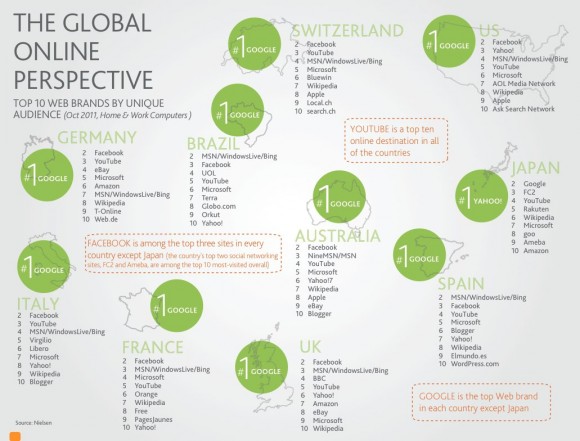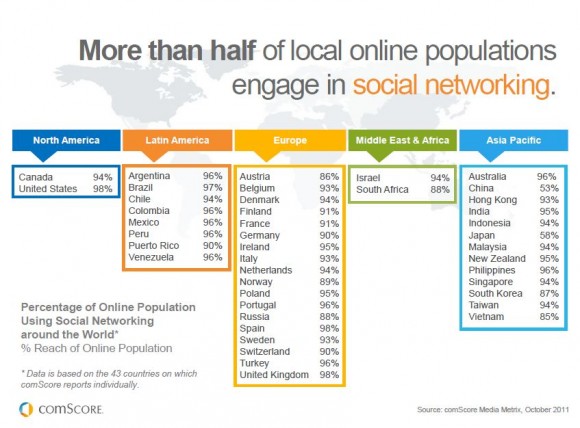Social media is fast becoming an essential part of an online marketer’s strategy, not only because of its ability to connect businesses with relevant online communities but also because it provides sites with natural back links. Whilst tweeting and ‘liking’ particular blog posts is a way of engaging in social sharing, it is simply not enough to influence the overall outcome of an SEO campaign, particularly for those who target different countries.
Brian Solis has produced this infographic which shows some interesting, and surprising, trends:

Whilst Google remains the most popular web brand in every country except Japan, not every country primarily uses the tool in search. Russia favours Yandex, China uses Baidu; search operators which both have separate factors affecting link value, weight and, ultimately, rankings.
Globalisation, along with the dramatic availability and growth in technology, has had a ‘shrinking’ effect on the world as a whole. People, as a result, have altered the way in which they receive and digest news and information. However, different cultures, behaviours and languages are still very much present in the online community which is reflected in web and social media trends. Whilst the UK engages in social networking sites and forums, France focuses on blogging as a form of online interaction. It is also worth noting that Facebook and Twitter are not favoured in every country. Cultural differences mean that certain restrictions apply to freedom of speech. In Japan, social network site Mixi is extremely popular among locals whilst Russians prefer VKontakte.

For global businesses, the need to ‘be social’ is vital both for raising brand awareness and maintaining loyal relationships with communities. However, one single strategy will not be successful for every country and domain. Instead extensive research into search and social trends, plus separate strategies, will be needed to optimise each site in each country. Good translation is key but it is important to firstly discover what people are searching for, how they are doing it, when, why and so on.
Anyone who works in online marketing will be aware of Google’s hatred of duplicate content. However, when translated, Google does not recognise and define this as duplicate, which allows for separate domains or sub domains to be kept relatively the same. Link building, on the other hand, will need to be tailored to suit each country’s preferred communication and engagement method. That is why we should strive for interesting, unique and high quality content that can be shared, liked and commented on by those in separate parts of the world.
Social signals have largely been discussed amongst SEO professionals who are still to this day unsure of their direct effectiveness on rankings. However, one thing is for sure; if a piece of content is being shared across communities, it is getting read, appreciated and promoted. This ultimately leaves a link in good stead of becoming effective in a campaign. Targeting different countries will have a direct effect on the strategy, meaning those who reach out to Japan will need to focus on Yahoo’s dictation of link relevance and offer social buttons to that countries favoured social media sites.
Localising sites to adapt to other search engine spiders that crawl the web differentiating between pages, relevance and authority is a sure fire way to reach potential customers. A local domain name will be favoured by search operators and the creation of these separate sub domains should be the first step in a multilingual strategy.
When developing an SEO strategy for different countries it is important to consider the behaviour in both social networks and mobile devices on each platform. There is no universal strategy that will be effective in every continent and extensive research needs to be completed before link building can commence. Localisation is key in this area. Although it may first seem ideal to broadcast a campaign on a global scale only using translation, in reality the very people you are trying to reach may be missed. Targeting each country differently will allow for local, cultural and geographical references to be made and be appreciated. By engaging with cultures on a local level, bridges can be built to connect a brand with customers.


